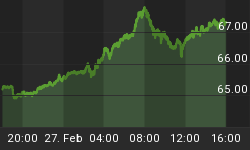The World Cup starts tomorrow, and while football fans are focused on the opening game between Saudi Arabia and Russia, from a finance perspective, one of the bigger questions is this: Will the Russian economy benefit?
Russia spent a total of $11.6 billion on preparations for the World Cup, which kicks off on Thursday, June 14, and much of the money went to new stadiums and transport infrastructure.
Thirty-two teams will compete in 11 cities from June 14 to July 15, and for the first time in World Cup history, Russia is hosting it.
But it can be both a blessing and a curse. Initially, the costs to Russia were estimated to be $11 billion, until late last year when the government added another $600 million to the price tag.
So what exactly will that investment get Russia?
Government officials argue the event will boost the Russian economy by as much as $31 billion over the next 10 years through increased tourism, investment and ancillary benefits. An estimated 1.2 million soccer fans will attend the games.
Not everyone agrees, though, on the longevity of the benefits.
According to credit rating agency Moody’s, which analyzes the event’s influence every four years, positive impact on the Russian economy from the World Cup is likely to be short-lived.
The agency noted that Brazil spent $15 billion to organize 2014 World Cup and it provided an economic stimulus of just $11.1 billion to the country’s economy.
“We see very limited economic impact at the national level given the limited duration of the World Cup and the very large size of the country’s economy,” Moody’s analysts said expecting the boost to tourism will be short-lived.
Quite a few things have changed politically and financially for Russia, since 2010 when it was awarded World Cup hosting rights.
Around that time, oil prices started a surge beyond $100 per barrel, fueling Russia’s bid for the 2014 Olympic Games in Sochi, for which Russia spent $51 billion, and this year World Cup hosting. However, by 2014 oil prices had slumped.
Since then, Russian banks and businessmen have been hit by international sanctions related to Russia’s military intervention in Ukraine and its annexation of the Crimea. Further still, additional sanctions have come this year, among other things for meddling in the 2016 U.S. presidential elections, and most recently, against companies said to have been enabling the cyber-attack capabilities of Russian security services.
Among 25 critical facilities connected to the World Cup, at least 12 are tied to people or companies who are now under U.S. sanctions. Thirteen Russian individuals and firms with World Cup ties have been included on the U.S. blacklist.
All of this has made it difficult to sign sponsors on for the World Cup, particularly since the revelation in May 2015 bribery within the FIFA officialdom and among dozens of international football leaders. Related: There's A New Cold War Brewing In Cyberspace
FIFA is set to earn more than $6 billion in the four-year cycle tied to this year’s World Cup, with an estimated profit exceeding $100 million.
Initially, in order to reach $6 billion, FIFA wanted a total of 14 deals in its top-tier sponsor slots, out of the total of 34 slots on offer. It only managed to clinch 12.
Some of the longest-serving sponsors from the U.S., Japan, Germany and Britain--including Sony, Emirates Group and Castrol—opted not to renew their deals following the 2014 Brazil World Cup. Instead, those slots were filled by Russian Gazprom, Qatar Airways, and four Chinese companies.
FIFA might see even more sponsorships lost in the future. Some of the traditional sponsors such as Coca-Cola and Visa, who are participating in the Russia World Cup, have criticized FIFA for corruption and threatened to abandon the stage. A handful of them have sponsorship contracts with FIFA until 2022.
That would be just in time for the next World Cup, scheduled to be hosted in Qatar and already marred with controversy, especially considering the Saudi-led economic blockade of Qatar.
By some estimates, the World Cup is going to cost Qatar approximately $220 billion. Qatar, hardly a soccer nation, has to build all the stadiums from scratch, along with hotels and infrastructure, to the host the event.
While there was earlier talk of the possibility of Qatar sharing the hosting responsibilities with a Gulf neighbor, no one wants to rock the Saudi boat.
Earlier this year, Saudi Arabia demanded that FIFA strip Qatar of its hosting rights in light of accusations of vote buying during the nomination process in 2010.
The 2022 schedule has already been changed, with the tournament moved from its usual June-July slot to November-December due to the fierce summer heat.
Overall, the World Cup, plagued as it is by scandal and hijacked by geopolitics, may not end up being the economic end-all for those countries continuously vying to play host.
By Damir Kaletovic for Safehaven.com
More Top Reads From Oilprice.com:
















